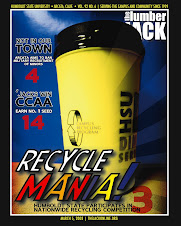 Don't promise what you can't deliver
Don't promise what you can't deliverThe cover looked great but the story disappointed. Never promise or tease the reader with something that you can't deliver. The cover promised a story about a problematic switchover from WebRe
 g to Student Center, but you only had some mild complaints in the story.
g to Student Center, but you only had some mild complaints in the story.The problem was that you missed the story. You bury and brush over this:
- That the software cost HSU $14 million
- That the reason the school had to buy it was that the chancellor forced it on all CSU's
- That it is made by a company called PeopleSoft.
This could have been a great story. Next time you need to...

Do your research
If you had done a basic news background search on LexisNexis or Factiva, you would have found story after story about problems at other CSU campuses.

If you don't know how to do basic research you need to sit down with a reference librarian at the library. They will show you the great databases the library offers (which you can access from any computer) and how to use them. Once you graduate, databases like LexisNexis and Factiva cost so much money, few newspapers give their reporters access to them.
I still found errors in this issue:
Staff Wrier
23 CSU's
People Soft
Who instead of which
Her instead of her
kids used as a reference to children
This years focus
Don't confuse your reader
I drew question marks in the margins of several stories. And that was the real problem with this issue.

Take for example the lede to the light bulb story:
LED lights are light everyday household items like digital clocks, remote controls and even the red stop light you almost ran through today.
I had to read that sentence three times and I still didn't get it.
In the same story you started one paragraph this way:
President of C. Crane Co. Rob C. Crane, discussed the creation fo the GeoBulb...
But you never told me about any C.Crane Co. so I didn't know who the heck this guy Rob C. Crane was or why he was in the story.
Then there was the profile of Julie Sheppard. She is separated from her twin for only one month of her life. But she's f
 rom Los Angeles, and her twin just graduated from HSU and convinced her to enroll. So did she just hang out with her sister while the twin went to college? Or did the twin get a four year degree in one month? I couldn't figure it out.
rom Los Angeles, and her twin just graduated from HSU and convinced her to enroll. So did she just hang out with her sister while the twin went to college? Or did the twin get a four year degree in one month? I couldn't figure it out.In the Plan-It Green story you mention Winzler and Kelly and the reader doesn't know who those two guys are or that it is the name of a local company.
And in the Men's Rugby story you have this sentence:
With Pleasant being a big factor in the 15 on 15 goal line stand, he is humble and looks forward to nationals.
What's a 15 on 15 goal line stand?

So SLOW DOWN
Take your reader slowly through the elements in the story. After each sentence ask yourself two questions:
Does the reader need to know this?
Will my reader be confused by this?
Meanwhile I still found way too much passive phrasing in your stories.
Not:
Making sure that its clients are well-fed is a main priority.Instead:
The Endeavor's main priority is to keep its clients fed.Not:
A number of the photographs were taken by A.W. Ericson...
Instead:
A.W. Ericson took a number of the photographs.
Keep it short
Your editorials are too wordy. You use an awful lot of words and space for a simple message: The school spent too much money for a new software program.
There was some nice showing in this issue.
Scott shook left, opening a little space for himself, then picked up speed and lowered his shoulder into a Western Oregon defender. The crowd was silenced as he moved his legs like a locomotive.You asked some good questions in this issue but you need to...
Question the Answers
When you asked Slattery if she liked her experience at Humboldt she said: "Kind of, but not really."
But then you move on to a new question altogether, leaving the reader to wonder what about Humboldt Slattery doesn't like.
.

























No comments:
Post a Comment